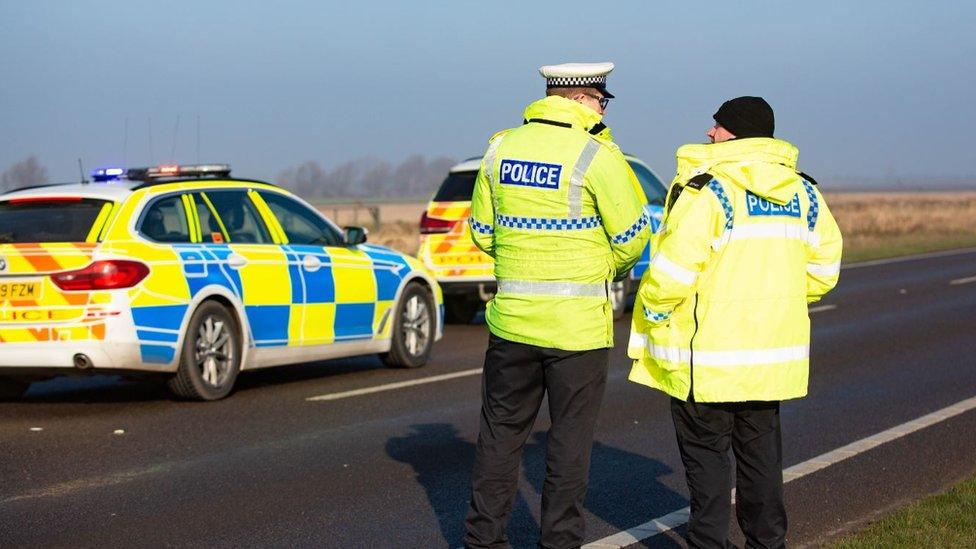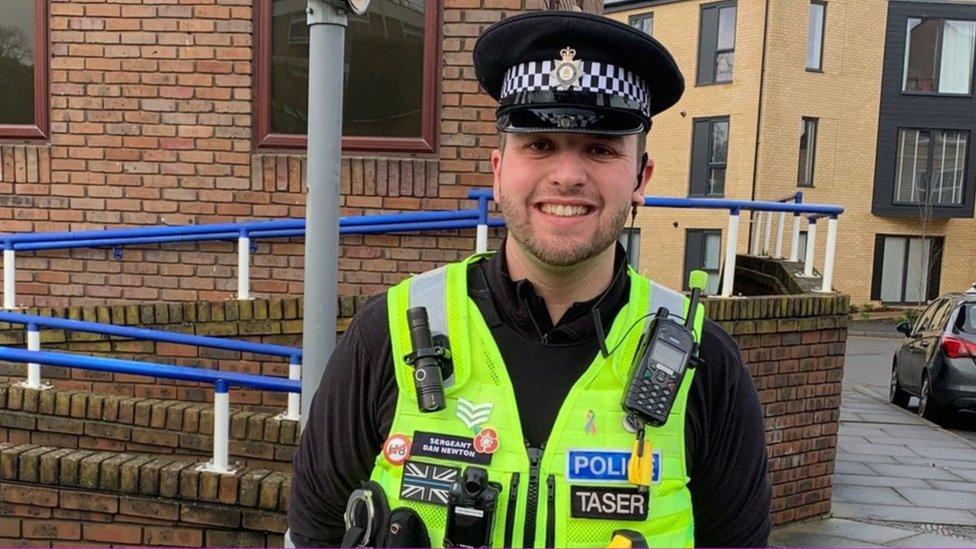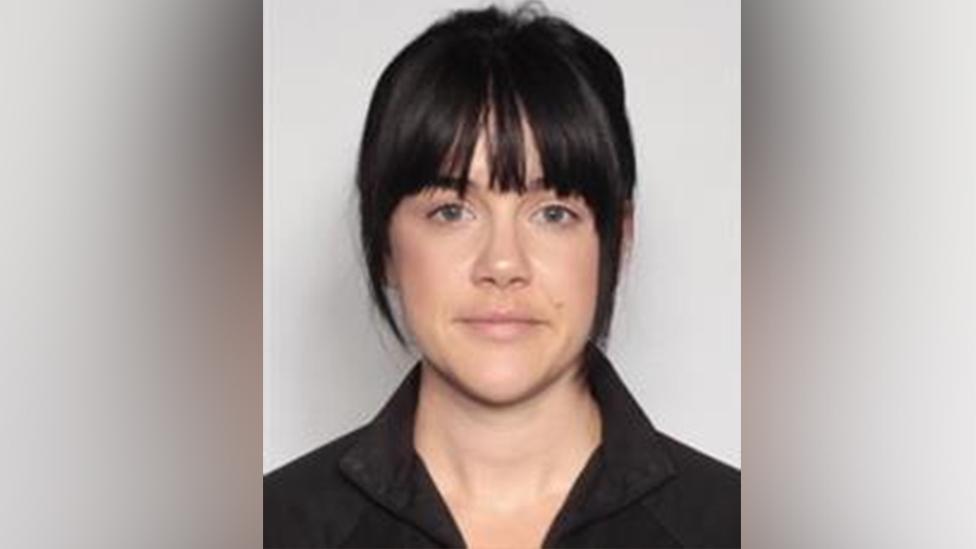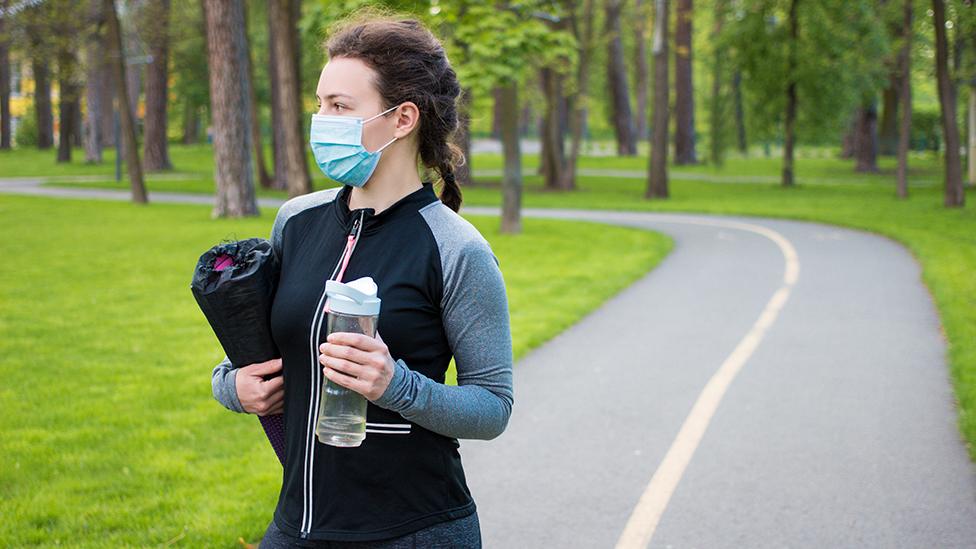Covid-19: Policing the coronavirus law breakers
- Published

Between the start of the pandemic and late December, Cambridgeshire Constabulary had issued 280 fines
Since the onset of the pandemic last March, thousands of people across the UK have either been fined or criminally prosecuted for coronavirus-related offences. What is it like for police officers having to tackle the Covid-19 rule-breakers?
Cambridgeshire, with its mix of cities, large towns and rural areas, is a fairly typical English county.
Its inhabitants, however, are far less likely to be fined for coronavirus rule breaches than those in most other parts of the country.
Between the start of the pandemic and late December, Cambridgeshire Police had issued 280 fines, with lockdown breaches, external or failing to wear protective masks accounting for the majority.
While the fine rate in Cambridgeshire is higher than counties such as Kent and Essex, it is a fraction of that of places including Northamptonshire, Dorset and Cumbria.
Part of the reason for the differences, officers say, is that fines are meant to be a last resort.
PC Jack Cooke has yet to issue a fine, though he admits some of those he has encountered came "very close" to getting one.
"Most people are behaving themselves and sticking to the rules," he says.
"I've had opportunities where I could have dished out fines on several occasions but at the moment our force wants us to engage with the public first, explain again the pandemic and why it is important for everybody to do their bit.
"So far nobody has been obstructive.
"I've caught people out who are either wilfully ignorant to it or just plain trying to get away with it. But they've been apologetic, they've listened when told to go home and so far I've not had to give those fines.
"I've been very close, mind."

How do police enforce Covid rules?
Police chiefs have followed a system called "The Four Es". Before fines are issued to rule-breakers, police will first:
Engage with people, to ask why they appear to be breaking the rules
Explain the law, stressing the risks to public health and the NHS
Encourage them to change their behaviour
The fourth "E" is "Enforce" by issuing penalty notices, as a last resort.
Source: BBC

PC Cooke said several calls came in over a period of about three months concerning a public house hosting suspected lock-ins.
"That in itself could attract a £10,000 fine for the owner if they were caught in breach of the rules," he says. "I did rock up and you had the red-flag signs of the blinds down and the light on inside and I thought to myself 'oh here we go'.
"There was about eight of them in there having a drink together."
He said those inside were all co-workers who had been "legitimately working alongside one another earlier in the day".
"Because he was very apologetic and it was the first time a police officer had spoken to him quite candidly about how dangerous the situation he was putting himself and his staff in, I decided not to fine him or the others but told them it was their first and only warning," he says.
Asked whether in hindsight he should have issued a fine, PC Cooke says: "I don't want to ruin anybody's life and I do believe in a bit of give and take and compromise, and if somebody is willing to listen to reason and admit to what they've done then I believe in giving members of the public a break.
"There will be a divide, I appreciate that, and there will be some who say I should have made an example. But then I would have ruined that person's life.
"The incident has been logged, all of the details are there, so should we go back there will be no hesitation next time."
You might also be interested in:

Sgt Daniel Newton told how on one occasion a rule-breaker - caught holding a four-person house party - thought he would just get a "warning and a ticking off"
Huntingdon-based Sgt Daniel Newton, meanwhile, has issued fines.
An officer with nine years of service, he says: "It is a very different and unique part of my policing career, shall we say. It is not something I ever anticipated or foresaw when joining the job.
"I've had to hand out fines before. A lot of it is naivety. On the whole we do have a lot of people who are complying, who do their best and take every precaution they can and follow the restrictions to the tee. Those people we do thank.
"On the flip side are people who are very dismissive of the dangers of having the virus about, people who don't believe the virus is out there at all. People really should understand after nearly a year what their responsibilities are."
He said on one occasion a rule-breaker - caught holding a four-person house party - thought he would just get a "warning and a ticking off".
"Unfortunately in this case they tried to provide false details, which didn't help them, and a fine was the most appropriate response," said Sgt Newton, whose mother is a nurse in Ipswich and father a shop worker.
"They were surprised at the £200 fine and voiced regret that they had been caught out."

Policing coronavirus laws comes on top of the usual work officers have to do, says PC Kirsty Hulley
PC Kirsty Hulley, who is based in Wisbech, has fined people on two separate occasions.
She says the public should be mindful of the fact that coronavirus has added another level of policing to what was already a full workload.
"It is difficult but I do still love my job," she says. "Overall people are sticking to the restrictions and pulling together to get back to a more normal way of life.
"There are some people who do feign ignorance, claiming that they don't know the rules or that they don't apply to them and understandably some people are getting fed up with lockdown and restrictions.
"It is obviously very difficult for people not being able to see their families. We get that."
Most of the violations she has dealt with involve social distancing breaches, of people meeting up with friends.
"I do sometimes think people see me, as a police officer, as an easy person to vent their frustrations out on.
"I'm happy to do that in a constructive way, in which I can listen to them but also explain why we have these restrictions in place, why we are as tough as we are, and how it is ultimately to save people's lives and to save the NHS."

Find BBC News: East of England on Facebook, external, Instagram, external and Twitter, external. If you have a story suggestion email eastofenglandnews@bbc.co.uk
Related topics
- Published12 January 2021
